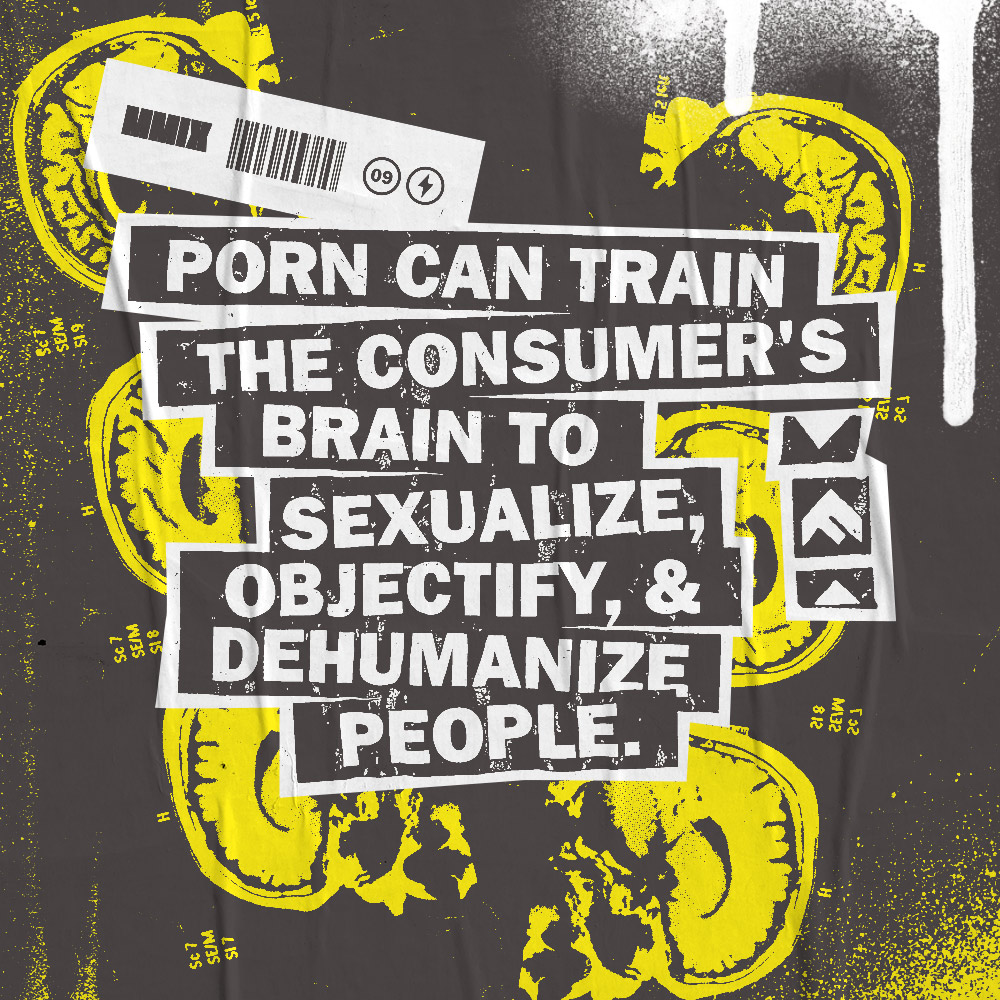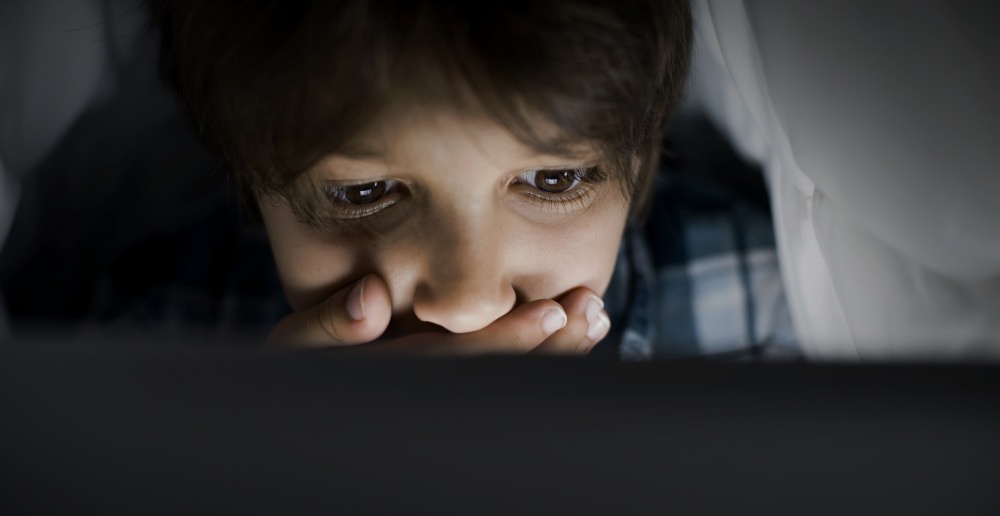Given what we know about how watching pornography can warp ideas about sex with sketchy but enticing lies—like: pleasure is all that matters, porn is a healthy way to discover your sexuality, or violence is sexy—it’s about time people started realizing the potential harms.
This is especially true for children and teens who deserve a chance to learn about sex in a safe environment—far away from screens showing gangbangs or forced anal sex.
Still, the reality is, kids do look at porn. A lot.
Studies indicate that most young people are exposed to porn by age 13,British Board of Film Classification. (2020). Young people, pornography & age-verification. BBFC. Retrieved from https://www.bbfc.co.uk/about-classification/researchCopy and according to a nationally representative survey of U.S. teens, 84.4% of 14 to 18-year-old males and 57% of 14 to 18-year-old females have viewed pornography.Wright, P. J., Paul, B., & Herbenick, D. (2021). Preliminary insights from a U.S. probability sample on adolescents’ pornography exposure, media psychology, and sexual aggression. J.Health Commun., 1-8. doi:10.1080/10810730.2021.1887980Copy That likely means that most young people are getting at least some of their education about sex from porn, whether they mean to or not. In fact, one study shows that approximately 45% of teens who consumed porn did so in part to learn about sex.British Board of Film Classification. (2020). Young people, pornography & age-verification. BBFC. Retrieved from https://www.bbfc.co.uk/about-classification/researchCopy
While many activists across the world have shouted about the need to protect children and teens from porn that is way too easy to access, the UK was the first country to give it a try. So far it hasn’t gone well.
Before we continue, we want to clarify that we are a non-legislative and non-religious nonprofit. And though we do not involve ourselves with legislative efforts surrounding porn, we are all for protecting young people from watching porn. We support global efforts to protect children from being able to easily access hardcore internet pornography that can warp their understanding of what healthy sexuality is. (We think even the most pro-porn advocates would have to agree that young children being exposed to hardcore porn is not healthy.) Every day, we at Fight the New Drug hear from men and women who discovered pornography at a young age and have suffered its consequences, including addiction or compulsion, depression, isolation, and/or broken relationships.
When we see efforts that aim to prevent young children from coming in contact with porn, we applaud those efforts in hopes that fewer people’s lives will be hindered and hurt by porn’s proven negative effects.
What was the “porn block?”
After years of opposition, the UK has abandoned its age-verification law aimed at preventing young children and teenagers from accessing adult websites.
The so-called “porn block” required commercial porn sites to ensure users were over 18 years old, but the bill was never successfully implemented, instead plagued by years of delays.
Most porn websites have a landing page requiring users to confirm they are 18 years or older with the simple click of a button before entering the site. Obviously, this is a less than effective deterrent that any iPad-savvy toddler could get past.
The idea of age-verification for porn sites was floated on a campaign trail in 2015 before being included as Part 3 of the Digital Economy Act of 2017. It intended to place the responsibility on websites to confirm the age of their users. If a porn site didn’t comply, they would face fines or be blocked in a similar way the government already blocks child pornography sites.
Almost immediately it was clear this could be a tricky task to tackle.
The demise of the age-verification law
From the get-go, there were objections. For example, it wasn’t initially clear what was considered a “commercial” porn site. Later statements excluded social media platforms where we know porn is widely available and easy to access. There’s also the obvious point that any user savvy enough to use a VPN could easily get around blocks in the UK.
As Carolyn Bunting, CEO of Internet Matters, said, “The planned implementation of age verification would have been successful in addressing the issue of children stumbling across online pornography, but it would have been naive to believe it was the be-all-and-end-all to prevent under 18s actively seeking it out.”
Related: Why 11 & 12-Year-Olds Are Struggling With Porn More Than Ever Before
Still, making the effort to protect kids was and still is agreed as a worthy goal. In an effort to be prepared to comply with the regulations, some private companies created age-verification tools for adult sites. Then it became controversial when MindGeek, owner of the biggest free porn sites in the industry, announced their own software called AgeID.
These tools worked by reviewing third-party identification such as a credit card, driver’s license, or passport before a user could access a porn site. They were to be free for users, which really means consumers pay with their data. Already, MindGeek’s sites harvest massive amounts of consumer data and use the information to influence what types of videos are made and even sexual trends. Rightfully, many people were concerned about handing over more personal information to the porn conglomerate.
Related: Kids Who Find Hardcore Porn Want To Repeat What They’ve Seen, Study Shows
With all of this data being collected, privacy immediately became a huge concern. Critics of the bill, such as Jill Killock the executive director of Open Rights Group, were concerned about a database of personal information and sexual preferences being a target for hacking and blackmail scams. It could have been a disaster waiting to happen, like the Ashley Madison breach in 2015.
A more digitally anonymous idea was the “porn pass,” which was a physical card that could be purchased from a convenience store after showing ID. But this idea couldn’t calm the privacy concerns that resulted in delay after delay—until the law was dropped in October this year.
Is this the end of age-verification?
Despite the clear setbacks and challenges of trying to make age-verification work, it’s not going away in the UK just yet.
With the abandonment of the current bill, the government announced they will be looking into the issue of age verification and broader protection against online harms in a white paper.
This is intended to advise and suggest legislation to make “companies more responsible for their users’ safety online, especially children and other vulnerable groups.” The aim is for companies to be accountable for addressing illegal activity on their platforms as well as harmful behaviors that may not necessarily be criminal.
“This is not an indefinite postponement of the measures that we are seeking to introduce,” Matt Warman, Parliamentary Under-Secretary of State for Digital, Culture, Media and Sport, said. “This is it is an extension of what they will achieve.”
As a nonreligious and non-legislative organization, we are still interested in and supportive of global efforts to protect children from easily accessing hardcore porn. Every day, we hear from men and women who discovered porn at a young age and have suffered its effects: depression, loneliness, broken relationships, and more.
Kids’ brains are susceptible to the harms of porn because the images are both shocking and new. At young ages, children have a healthy curiosity, but little understanding of sex. Porn can warp their ideas of what healthy sex and intimate relationships could be.
We believe kids deserve a chance to let all of their ideas grow in a safe space not hindered by porn’s negative effects.




